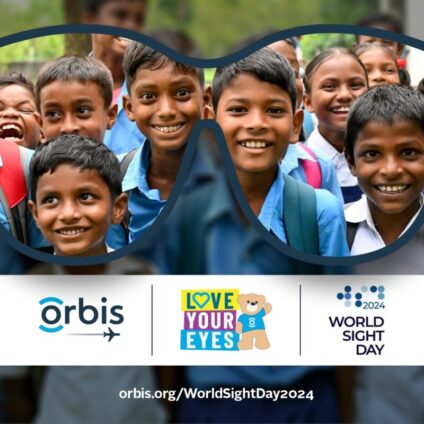
Audio By Carbonatix
Orbis International, a non-governmental organization, has revealed that refractive errors, particularly myopia (nearsightedness), are a leading cause of visual impairment and blindness in children.
In a press release issued to mark World Sight Day 2024, the organization highlighted that this condition affects approximately 448 million children and adolescents globally.
It added that the prevalence of myopia among the youth is rapidly increasing in various parts of the world, largely attributed to lifestyle changes.
“Refractive errors—vision problems where the shape of the eye prevents light from focusing correctly on the retina—are very common among children. Myopia, the most prevalent type of refractive error in children, causes distant objects to appear blurry. Treatments for myopia include corrective glasses, contact lenses, or surgery.”
While the report noted a decrease in the number of children blinded by eye conditions worldwide, this decline is primarily due to reduced cases of corneal blindness caused by vitamin A deficiency and measles.
The statement clarified, “However, this does not include refractive errors.”
The organization emphasized the importance of addressing squinted eyes (strabismus), which can lead to lazy eyes (amblyopia) if untreated.
“Squinted eyes can be treated before age 7. Without intervention, children may lose vision in the affected eye. No child is too young to wear spectacles; even babies can wear glasses following a thorough examination and prescription.”
To ensure the optimal eye health of children, Orbis International urged parents to adopt proactive measures, including:
Attend regular eye exams: Schedule comprehensive eye examinations for children before they enter pre-school and primary school. If no eye problems are detected, aim for check-ups every two years.
Boost visual engagement for toddlers and babies: Use high-contrast colours and engage in activities like games of catch, pat-a-cake, and peekaboo to improve hand-eye coordination.
Provide a balanced diet: Nutrients such as zinc, lutein, omega-3 fatty acids (found in fish), and vitamin A (from leafy greens) are crucial for preventing dry eyes and night blindness.
Vitamins C and E (from fruits like oranges and mangoes) also support eye health, while eggs and nuts are excellent sources of essential nutrients.
Limit digital screen time: Keep screens at a distance of 18 to 24 inches from your child’s eyes to minimize strain.
Look out for warning signs: Parents should be vigilant for signs of vision problems, including bumping into objects, squinting, disinterest in distant objects, head tilting, holding items very close, eye rubbing, light sensitivity, and poor hand-eye coordination.
Latest Stories
-
Ghana is rising again – Mahama declares
40 minutes -
Firefighters subdue blaze at Accra’s Tudu, officials warn of busy fire season ahead
1 hour -
New Year’s Luv FM Family Party in the park ends in grand style at Rattray park
1 hour -
Mahama targets digital schools, universal healthcare, and food self-sufficiency in 2026
1 hour -
Ghana’s global image boosted by our world-acclaimed reset agenda – Mahama
2 hours -
Full text: Mahama’s New Year message to the nation
2 hours -
The foundation is laid; now we accelerate and expand in 2026 – Mahama
2 hours -
There is no NPP, CPP nor NDC Ghana, only one Ghana – Mahama
2 hours -
Eduwatch praises education financing gains but warns delays, teacher gaps could derail reforms
2 hours -
Kusaal Wikimedians take local language online in 14-day digital campaign
3 hours -
Stop interfering in each other’s roles – Bole-Bamboi MP appeals to traditional rulers for peace
3 hours -
Playback: President Mahama addressed the nation in New Year message
4 hours -
Industrial and Commercial Workers’ Union call for strong work ethics, economic participation in 2026 new year message
6 hours -
Crossover Joy: Churches in Ghana welcome 2026 with fire and faith
6 hours -
Traffic chaos on Accra–Kumasi Highway leaves hundreds stranded as diversions gridlock
6 hours

